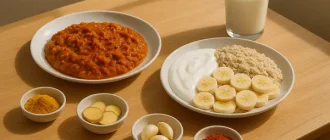A colonoscopy is certainly not the most pleasant procedure, but it is often hard to overemphasize its importance in assessing colon health.
It is crucial to properly prepare for this procedure in order to guarantee that the healthcare providers have a clear view of the colon. This article will primarily focus on the importance of diet in the preparation phase.
A Week Before the Procedure
Medical professionals often recommend that patients avoid eating certain foods in the week leading up to a colonoscopy. It is best to stay away from seeds, nuts, or any other types of food that may remain in the digestive system and potentially hinder visibility during the procedure.
Avoid High Fiber Foods
Typically, high fiber foods like whole grains, raw vegetables and most fruits must be avoided before this procedure. This would mean excluding beans, peas, lentils, broccoli, pears, and apples from your diet. Ideally, a diet with minimal residue, i.e., low-fiber foods like white bread, rice and lean meat is generally recommended.
| Foods to Avoid | Foods to Consume |
|---|---|
| Whole grains | White bread |
| Raw vegetables | White rice |
| Beans | Lean meat |
| Peas | Poultry |
| Lentils | Fish |
The Day Before the Procedure
This day is typically characterized by a clear liquid diet. This includes broths and clear juices, plain gelatin, tea and coffee(without cream). However, red or purple colored liquids should be avoided as they can be mistaken for blood during the procedure.
The Day of the Colonoscopy
It is advised to adhere to a diet consisting only of transparent fluids until two hours prior to the colonoscopy on the designated day. After that time, it is crucial to refrain from consuming any food or beverages, including water.
Post-Colonoscopy
After the procedure, medical professionals suggest a post-treatment diet that is soothing for the digestive system, consisting of easily digested foods like soup, crackers, toast, and eggs.
Conclusion
In order to achieve improved results and faster recovery, it is necessary to adhere to a specific diet both before and after undergoing a colonoscopy. Prior to making any significant adjustments to your diet, it is crucial to seek guidance from your healthcare professional.
It is equally important to carefully follow the instructions provided by the medical team. The clarity of the colon is crucial for the success of this procedure, making adherence to dietary recommendations absolutely necessary.
Usually, it is advised to steer clear of high fiber foods such as whole grains, uncooked vegetables, and the majority of fruits prior to undergoing this procedure. This entails eliminating beans, peas, lentils, broccoli, pears, and apples from your diet. Ideally, it is generally recommended to follow a low-residue diet composed of low-fiber foods like white bread, rice, and lean meat.
About the Author
Reyus Mammadli is the author of this health blog since 2008. With a background in medical and biotechnical devices, he has over 15 years of experience working with medical literature and expert guidelines from WHO, CDC, Mayo Clinic, and others. His goal is to present clear, accurate health information for everyday readers — not as a substitute for medical advice.







